हमारे महापुरुष - अंक 06: Inspiring Generations - The Timeless Philosophy of Swami Vivekananda
28 Sep 2024 10:32:02
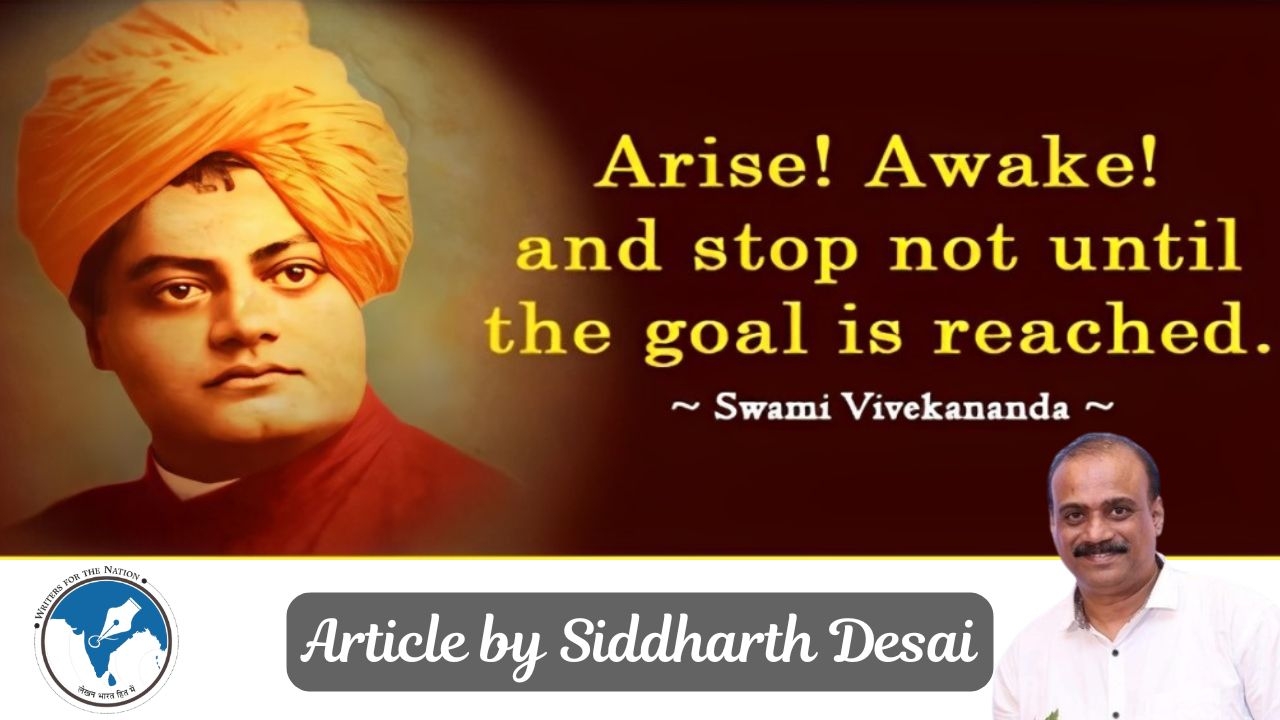
"Arise, awake, and stop not till the goal is reached." Swami Vivekananda's messages continue to inspire millions of people in the country and worldwide today, especially the youth.
When we think of Swami Vivekananda, we envision a vibrant young monk who was a vast knowledge repository. His thoughts and philosophy were filled with a sense of universal brotherhood.
He envisioned a society where the greatest truths could be revealed. For Vivekananda, truth was his deity; he regarded the entire world as his country.
He believed there is only one truth, but there are many paths to reach it. Thankfully, Swami Vivekananda placed India's Vedic tradition on the global stage.
Instead of promoting superiority based on religious grounds, he envisioned a universal religion, which was not a separate faith but a principle of global brotherhood hidden within each belief.
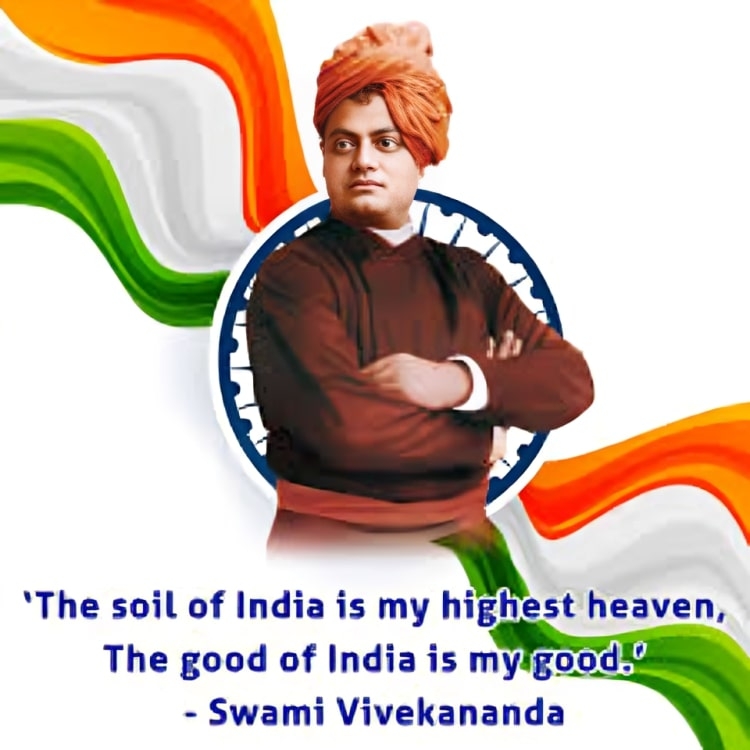
Vivekananda considered the soil of India to be the greatest heaven. He had faith in serving humanity and stated that he was neither a leader nor involved in political movements; his focus was solely on the soul.
He believed that if the soul is right, then everything else will be right.
Swami Vivekananda, a pioneer of the Indian Renaissance, was born on January 12, 1863, in Kolkata, to the renowned lawyer Vishwanath Datta. His mother, Bhubaneshwari Devi, lovingly called him ‘Vireshwar’ (Bireshwar), but during the naming ceremony, he was given the name Narendranath Datta.
Born into a Bengali family, Narendra had a spiritual inclination from childhood. He was known for his playful nature, often teasing teachers and playing pranks with his friends.
Influenced by the religious and spiritual environment of his family, young Narendra was deeply imbued with the values of religion and spirituality from an early age.
After completing his primary education, he was enrolled in the Metropolitan Institute in Kolkata. Alongside his studies, he was interested in sports, music, and horseback riding.
Narendra had an exceptional memory; he could memorise entire texts after reading them just once, including the complete grammar of Sanskrit, the Ramayana, and the Mahabharata.
Initially, Narendra was reluctant to learn English, believing it to be the language of those who had occupied his motherland. However, he later not only began to learn English but also mastered it.
From childhood, he exhibited leadership qualities and did not simply accept things at face value; he sought to test their validity. The thought of becoming a monk also lingered in his young mind.
At the age of 14, after falling ill, his father Vishwanath Datta called him to Raipur in Madhya Pradesh. It was in Raipur that Narendra began to understand various aspects of life.
His inner consciousness developed through wandering in the surrounding hills and dense forests. After spending two years in Raipur, he returned to Kolkata. At the age of 18, he enrolled in Presidency College in Kolkata, where his thirst for knowledge grew.
Questions about the truths of the world and the quest for reality began to stir a rebellion within him. He became uneasy with traditions and rituals and grew restless in unravelling the mysteries of the divine.
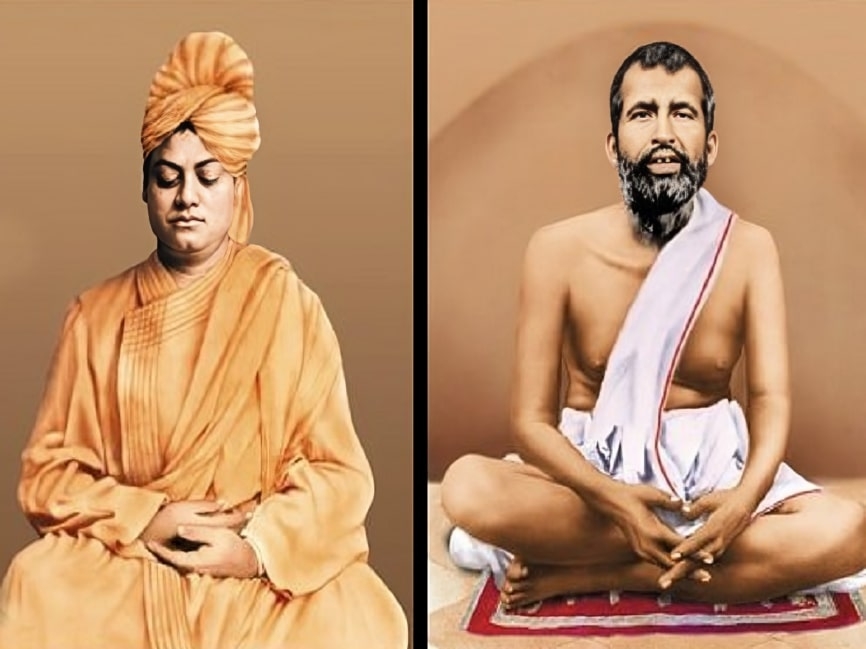
In 1881, he met Swami Ramakrishna Paramahamsa, the priest at the Dakshineswar Kali Temple in Kolkata. This encounter brought a revolutionary change in Narendra's life, and he accepted Ramakrishna as his guru and guide.
After Ramakrishna's passing in 1886, Vivekananda's life and work took a new direction. Before leaving his body, Ramakrishna declared Narendra the leader of all his disciples.
Following this, the monk embraced the name Vivekananda and established the Baranagar Math, where he began his spiritual experiments. Adhering to the Indian Math tradition, Vivekananda travelled for many years across different parts of the Indian subcontinent, donning the ochre robes of a monk. The entire country became his home, and all Indians became his brothers and sisters.
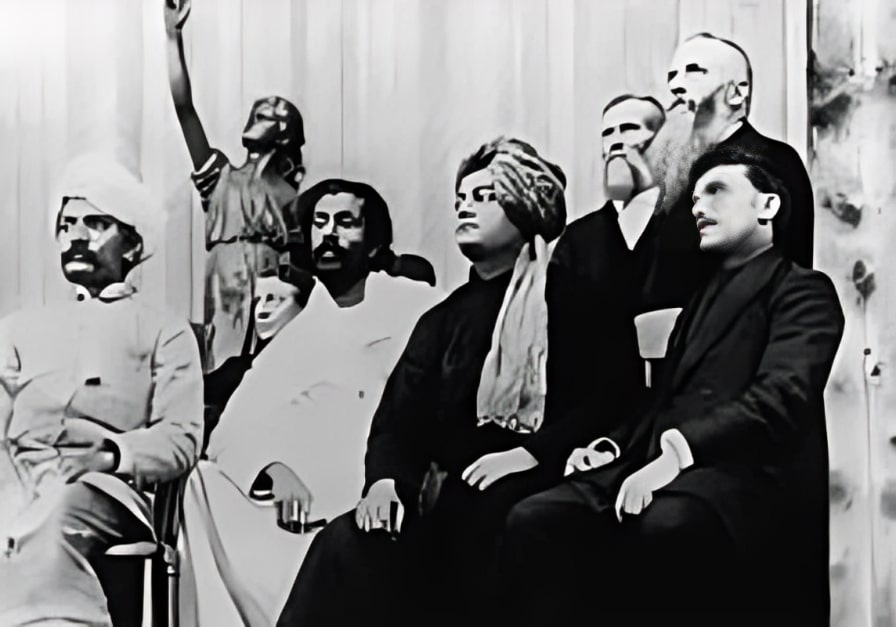
The World Parliament of Religions in Chicago in 1893 marked a turning point in Vivekananda's life. With the financial support of Maharaja Ajit Singh of Khetri in Rajasthan, Swami Vivekananda attended the Parliament, representing Sanatana Dharma on behalf of India.
On September 11, 1893, his extraordinary speech elevated India's stature on the global stage. For nearly four years, he travelled to various cities in America, as well as to London and Paris, spreading the message of peace.
He also visited Germany, Russia, and Eastern Europe, promoting the teachings of Vedanta everywhere and forming a dedicated group of disciples.
After four years of intense efforts, Vivekananda returned to India. On May 1, 1897, he established the Ramakrishna Mission in Belur, Kolkata, ensuring the propagation of the ideas of Ramakrishna Paramahamsa along with the profound knowledge of Vedanta.
He emphasised that serving the poor and the needy was the highest form of religion. Vivekananda told his companions and disciples that if they wished to serve God, they should serve the poor and those in need, believing that God resides within the downtrodden.
However, due to his relentless efforts, Swami Vivekananda's health continued to decline. In December 1898, he travelled again to America and other regions to participate in religious conferences.
After returning to India, Vivekananda passed away on July 4, 1902, at the young age of 39. He ignited the flame of spirituality across the world and remains a shining sun in India's spiritual sky, with his thoughts and actions still illuminating human society today.
The 19th century is considered the era of religious and social renaissance in India. During this time, individuals influenced by Western education began to scrutinise social traditions, religious practices, and customs through reason, attempting to guide society in a new direction.
In this context, Swami Vivekananda's role is particularly significant. He played a crucial part in India's social, religious, and political renaissance.
The most profound influence on Swami Vivekananda's thoughts comes from ancient Indian philosophy, especially Vedanta. Additionally, the impact of Buddhist philosophy is also clearly evident in his teachings.
He opposed superstition and conservative customs, influenced by the Brahmo Samaj. Furthermore, the teachings of the Gita had a significant effect on Vivekananda's ideas.
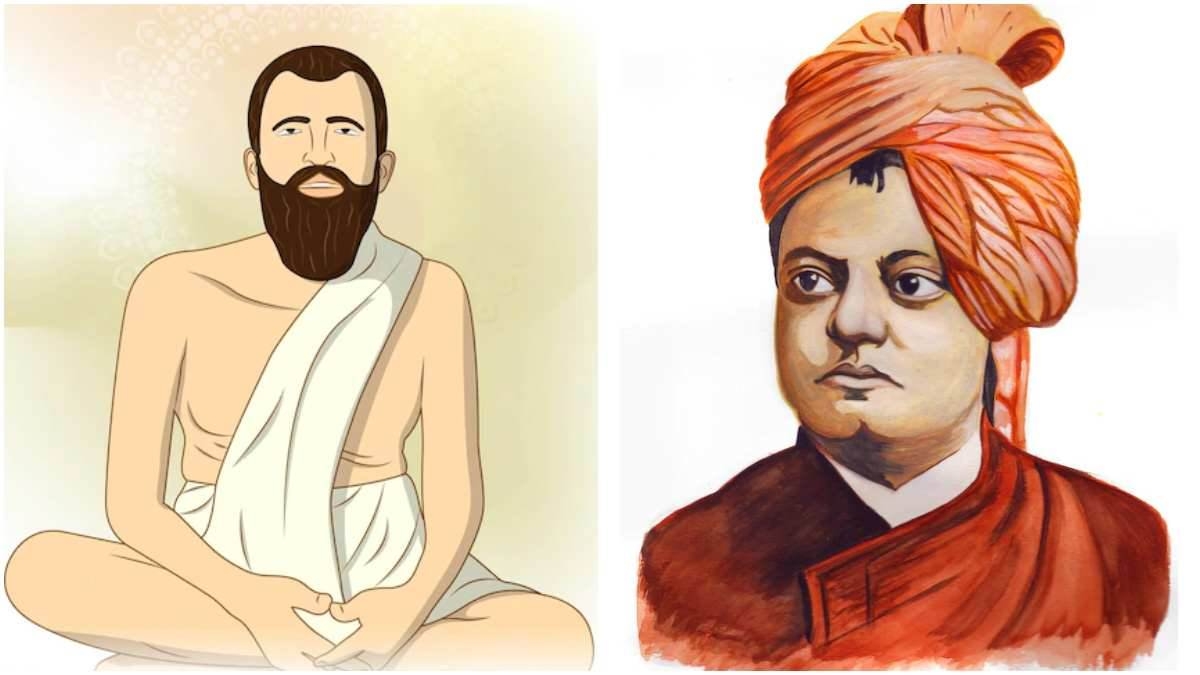
However, the greatest influence on his life and thoughts came from his guru, Swami Ramakrishna Paramahamsa, who initiated Vivekananda into spiritual discipline and contemplation.
Vivekananda’s philosophy can be regarded as a form of spirituality in many respects. His philosophical ideas exemplify spiritual realism. He believed that the ultimate reality is fundamentally spiritual. Vivekananda asserted that there are various ways to understand the ultimate truth.
From one perspective, Vivekananda can be seen as a universalist, yet he also referred to God as personal. His deep faith in God is expressed in the belief that living without faith in God is impossible.
He stated that it is not feasible to accept the existence of the world and the soul without acknowledging the existence of God.
Vivekananda established a basis for the existence of God in a common element inherent in all things, and he also believed in the possibility of direct experience of God.
In his philosophy, Vivekananda made room for both creationism and evolution. As a Vedantist, he also included the concept of Maya in his thoughts.
While this is similar to Shankara's idea of Maya, it differs in that Shankara views Maya as a power that creates an illusion, whereas Vivekananda posits that Maya is not an illusion but rather a factual description of the world. The contradictions expressed in the world are what constitute Maya.
Vivekananda’s thoughts on humanity clearly represent both spiritual and material aspects. He regarded the material aspect as inferior and the spiritual aspect as superior.
He described the soul as a unique essence that begins with reincarnation and culminates in liberation from rebirth. To explore how the soul can experience immortality, Vivekananda analysed the paths of knowledge (Gyan Yoga), devotion (Bhakti Yoga), and action (Karma Yoga). He also mentioned the need for complete control and discipline of the mind and body to attain immortality.
Vivekananda believed that among the powers guiding the destiny of humanity, religion has the most significant influence. He asserted that religion can never be denied.
He stated that the diversity of religions, their disagreements, and conflicts are essential for the life of religions.
Vivekananda asserts that the solution to the question of how religion can be universal lies in its very nature. He states that one identification of the universality of religions is that their doors remain open to every individual.
The second condition for universal religion is that it should satisfy and fulfil various religious institutions. Vivekananda believes that just as global brotherhood is possible, so too is universal religion a reality.
He claims that every religion, in essence, is a universal religion; however, we often overlook its universality for our convenience and the fulfilment of our ambitions, turning it into sectarianism.
He further clarifies that establishing a universal religion does not require adhering to any particular faith separately. Vivekananda encourages us to think with a universal mindset, which will allow us to see the commonality among all religions. The characteristic of a universal religion should be that it is readily accepted by all.
Swami Vivekananda is remembered not only as a saint, philosopher, and social reformer but also as a person who guided society in a new direction. The development of every aspect of his personality began with the values instilled in him by his family.
Swami Vivekananda, who introduced the world to Indian Sanatana Dharma, was inquisitive from a young age. He described the service of the poor as the service of God and adopted this belief as a lifelong principle.
"Arise, awake, and stop not till the goal is reached." These lines from Swami Vivekananda, a strong proponent of the Indian Renaissance, express his social thought and philosophy.
Vivekananda did not take social change lightly; rather, he appealed for social reconstruction in his way and dedicated his life to its realisation.
In the process of social reform, Vivekananda urged humanity to adopt a mindset of not destroying anything. He stated that destructive reformers can do no good for the world.
Instead of breaking things down and reducing them to dust, he encouraged building them up. If possible, offer assistance; if not, quietly stand by and observe how things unfold.
These thoughts reveal that Swami Vivekananda was an advocate of constructive social reform rather than destructive change, which sets him apart as a great figure among the social reformers of his time. He had a deep belief in the fundamental power of spirituality in India.
His spirituality was a realisation of the whole and universal soul, which is why his social reform was not complete in itself but was firmly rooted in a spiritual foundation. He believed that spiritual reform must come first; without it, no other reform is possible. He considered this to be a fundamental transformation.
While he also regarded social reform as extremely important, he believed it should not be mere pretence and should not be superficial. Only when there is a complete reform will it be meaningful and have a lasting impact.
He believed that the plight and condition of Indian society were due to a lack of willpower among the people. He stated that unless individuals stepped forward to solve their problems, no reform would take place; merely shouting would not bring about change.
Vivekananda emphasised that a social reformer must have deep empathy for society to truly understand the suffering of millions who are trapped in ignorance and poverty.
He also said that when the youth of this country sacrifice their comforts and conveniences for their impoverished and character-driven fellow citizens, only then will true progress be possible.
Swami Vivekananda believed that social change occurs from within rather than from outside. He emphasised the importance of strengthening society internally to bring about such change.
He attributed the existing inequalities in Indian society to class divisions and stated that the main reason for India's decline was that all knowledge and resources were monopolised by a handful of people through state power and coercion.
To change this situation, he stressed the need for the dissemination of education among the general population, which should be both moral and intellectual. Additionally, he believed it was essential to organise the marginalised sections of society to prepare them for their upliftment.
Swami Vivekananda believed that ideological change is essential before any social transformation. He linked social upliftment to self-upliftment.
Vivekananda aimed to bring about widespread change in India by accelerating the pace of social transformation, considering the roles of the body, mind, and soul to be significant.
However, he placed the greatest trust in the soul, which set him apart from others. According to Swami Vivekananda, the transformation of just one class or community would not lead to a complete change in India; it requires collective effort from everyone.
Until all people work in this direction, the change will remain incomplete. Hence, he sought to awaken the youth, women, the poor, labourers, and farmers.
In 1893, Swami Vivekananda delivered a highly discussed and historic speech at the World Parliament of Religions in Chicago. This speech and Vivekananda became complementary to each other from that point onward.
In this speech, Swami Vivekananda conveyed the most important message of India's hidden message of universal brotherhood and fraternity to the world.
In his short life of 39 years, Swami Vivekananda accomplished work that will guide generations to come for centuries. He addressed the social, political, and economic challenges we face today and spoke of reforms during a time when hardly anyone was paying attention to these issues. His thoughts and principles remain just as relevant today.
Swami Vivekananda raised questions about every challenge present in society during his time and offered ideas for their resolution, which remain relevant today.
One of the major challenges we face now is poverty, and regarding the approach to this issue, Vivekananda stated that every individual should be seen as divine. He believed that one cannot merely help others; one can only serve them.
He asserted that as long as millions remained hungry and deprived, he would consider anyone who gained education at the expense of the poor but showed no concern for them to be a traitor.
Vivekananda emphasised the importance of spreading education, stating that education does not merely mean accumulating information that has no practical use in life.
According to him, our education should focus on character building, individual development, and life enrichment. Those who acquire practical education are to be considered more educated than those who only gain bookish knowledge. His ideas on the promotion of education are still highly relevant today.
Vivekananda believed that the empowerment of women is essential for the empowerment of any society. He stated that if women are given education, they will indicate what kind of reforms are needed for them.
Due to the lack of education, women often have to depend on others. If women are not empowered, the country's progress will be hindered. Similarly, Vivekananda had unwavering faith in the youth.
He appealed to them to step forward for the development of the country and society, encouraging young people to remain steadfast in their ideas and work towards enhancing the nation's reputation globally.
Swami Vivekananda was not just a monk; he was a great patriot, an eloquent speaker, a thinker, a writer, and a lover of humanity. His ideas remain relevant today and continue to guide us.
Article by
_202409272235571531_H@@IGHT_326_W@@IDTH_380.jpeg)
Siddharth Desai
Columnist - Writers For The Nation
Mumbai, Maharashtra